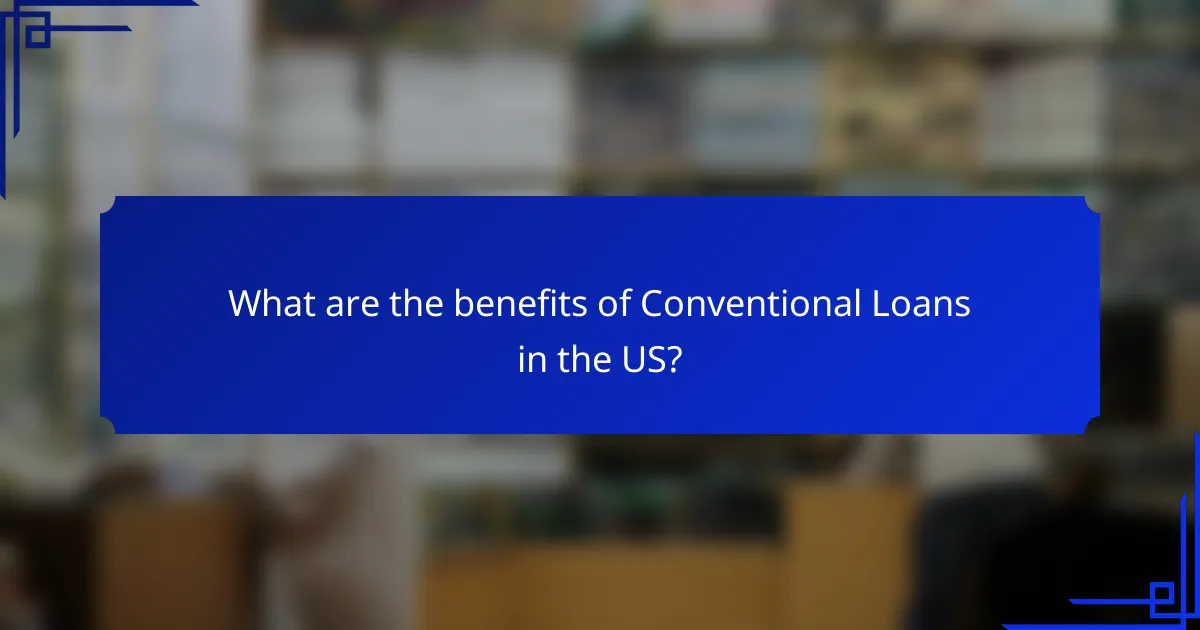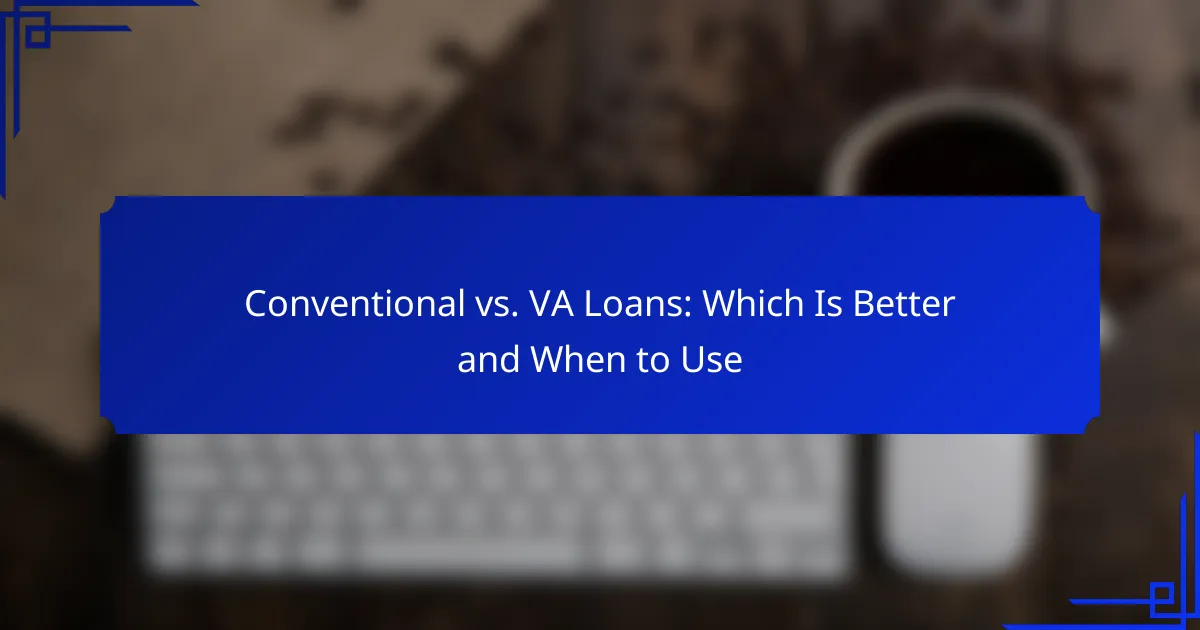When it comes to financing a home, understanding the differences between conventional and VA loans is crucial for potential buyers. Conventional loans are ideal for those with strong credit and stable finances, offering competitive rates and flexible terms. In contrast, VA loans cater specifically to veterans and active-duty service members, providing unique benefits such as no down payment and no private mortgage insurance. Choosing the right option depends on individual circumstances and eligibility.

What are the benefits of Conventional Loans in the US?
Conventional loans offer several advantages for homebuyers in the US, including competitive interest rates, flexible repayment terms, and no upfront mortgage insurance. These features make them an attractive option for many borrowers, especially those with good credit and stable financial backgrounds.
Lower interest rates
One of the primary benefits of conventional loans is their lower interest rates compared to other types of loans, such as FHA or VA loans. Borrowers with strong credit scores often qualify for rates in the low to mid single digits, which can lead to significant savings over the life of the loan.
To secure the best rates, maintain a credit score above 740 and consider making a larger down payment. This not only reduces the loan amount but also demonstrates financial stability to lenders.
Flexible terms
Conventional loans come with a variety of term lengths, typically ranging from 10 to 30 years. This flexibility allows borrowers to choose a repayment schedule that best fits their financial situation and long-term goals.
Shorter terms often come with lower interest rates, while longer terms can result in lower monthly payments. Evaluate your financial capacity and future plans when selecting the loan term that suits you best.
No upfront mortgage insurance
Unlike FHA loans, conventional loans do not require upfront mortgage insurance premiums. This can save borrowers thousands of dollars at closing, making homeownership more accessible.
However, if your down payment is less than 20%, private mortgage insurance (PMI) may be required, which adds to monthly payments. Plan accordingly to manage these costs effectively.
Wider acceptance
Conventional loans are widely accepted by lenders and can be used for various property types, including primary residences, second homes, and investment properties. This broad acceptance provides more options for borrowers.
When applying for a conventional loan, ensure that your chosen property meets the lender’s criteria to avoid complications during the approval process.
Higher loan limits
Conventional loans typically have higher loan limits than government-backed loans, which can be beneficial for buyers in high-cost areas. As of 2023, the conforming loan limit for a single-family home in most areas is around $726,200, with higher limits in certain regions.
Check the specific limits for your area to determine how much you can borrow. This can significantly impact your purchasing power and property options.

What are the benefits of VA Loans in the US?
VA loans offer several advantages for eligible veterans and active-duty service members, making them an attractive option for home financing. Key benefits include no down payment, no private mortgage insurance, competitive interest rates, and unique veteran-specific perks.
No down payment required
One of the most significant benefits of VA loans is that they do not require a down payment. This feature allows veterans to purchase homes without the financial burden of saving for a large upfront cost. This can be particularly advantageous in high-cost areas where down payments can be substantial.
By eliminating the need for a down payment, VA loans make homeownership more accessible, especially for first-time buyers who may struggle to save enough money. This can lead to quicker home purchases and increased opportunities for veterans to secure housing.
No private mortgage insurance
VA loans do not require private mortgage insurance (PMI), which is often a requirement for conventional loans when the down payment is less than 20%. This absence of PMI can lead to significant savings on monthly mortgage payments, making homeownership more affordable.
For example, without PMI, veterans can save hundreds of dollars each month, allowing them to allocate those funds towards other expenses or savings. This financial relief can be crucial for families managing a tight budget.
Competitive interest rates
VA loans typically offer lower interest rates compared to conventional loans, which can result in substantial savings over the life of the loan. These competitive rates are often due to the government backing that VA loans receive, reducing the risk for lenders.
Lower interest rates mean lower monthly payments, making it easier for veterans to manage their finances. This can be particularly beneficial in long-term financial planning, as even a small difference in interest rates can lead to significant savings over time.
Assumable loans
Another advantage of VA loans is that they are assumable, meaning that a buyer can take over the seller’s existing VA loan under its current terms. This can be particularly appealing in a rising interest rate environment, as the buyer may benefit from a lower rate than what is currently available.
For instance, if a veteran sells their home with a low-interest VA loan, the new buyer can assume that loan, making the property more attractive in the market. This feature can facilitate smoother transactions and potentially increase property values.
Veteran-specific benefits
VA loans come with additional benefits specifically designed for veterans, such as no prepayment penalties and flexible credit requirements. This makes it easier for veterans to refinance or pay off their loans without incurring extra costs.
Moreover, veterans can access specialized resources and support through the VA, including counseling and assistance with the home-buying process. These tailored services can help veterans navigate the complexities of homeownership and make informed decisions.

When should you choose a Conventional Loan?
Conventional loans are often a suitable choice for borrowers with strong financial profiles. They typically require higher credit scores and stable incomes, making them ideal for those looking to purchase primary residences or investment properties without the need for government backing.
High credit score
A high credit score is a significant advantage when applying for a conventional loan. Lenders usually prefer scores above 700, which can lead to better interest rates and terms. If your score is in the mid to high 700s or above, you are likely to qualify for more favorable loan conditions.
Maintaining a good credit score can save you thousands over the life of the loan. Regularly check your credit report for inaccuracies and keep your credit utilization low to ensure you remain in a strong position.
Stable income
Having a stable income is crucial when considering a conventional loan. Lenders typically look for consistent employment history, ideally spanning two years or more, to assess your ability to repay the loan. This stability reassures lenders that you can manage monthly mortgage payments.
To strengthen your application, document your income sources, including pay stubs, tax returns, and any additional income streams. This transparency can help you secure better loan terms.
Investment properties
Conventional loans are often the preferred option for financing investment properties. They allow for the purchase of rental homes or multi-family units, typically requiring a down payment of at least 15-25%. This down payment range can vary based on the property’s intended use and your creditworthiness.
Investors should consider the potential rental income and property appreciation when evaluating a conventional loan. Ensure that the expected cash flow covers the mortgage payments and other expenses to maintain a profitable investment.
Second homes
If you are looking to buy a second home, a conventional loan can be an excellent choice. These loans generally have fewer restrictions than government-backed options, allowing for more flexibility in property selection. A down payment of around 10-20% is common for second homes.
When financing a second home, be prepared to demonstrate that you can afford both the primary and secondary mortgage payments. Lenders will assess your overall financial health, including debt-to-income ratios, to ensure you can manage multiple properties.

When should you choose a VA Loan?
A VA loan is an excellent option for eligible veterans and active duty service members looking to purchase a home. These loans typically offer favorable terms, such as no down payment and lower interest rates, making them an attractive choice for those who qualify.
Active duty or veteran status
To be eligible for a VA loan, you must be an active duty service member or a veteran who has served in the military. This includes individuals who have completed a minimum period of service, which generally ranges from 90 days during wartime to 181 days during peacetime.
Additionally, surviving spouses of service members who died in the line of duty or as a result of a service-related condition may also qualify for VA loans. It’s essential to obtain a Certificate of Eligibility (COE) from the VA to confirm your status and access the benefits associated with VA loans.
